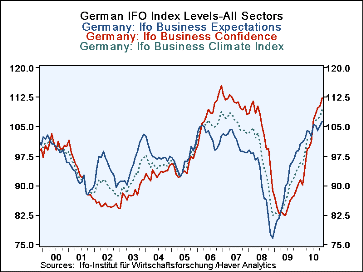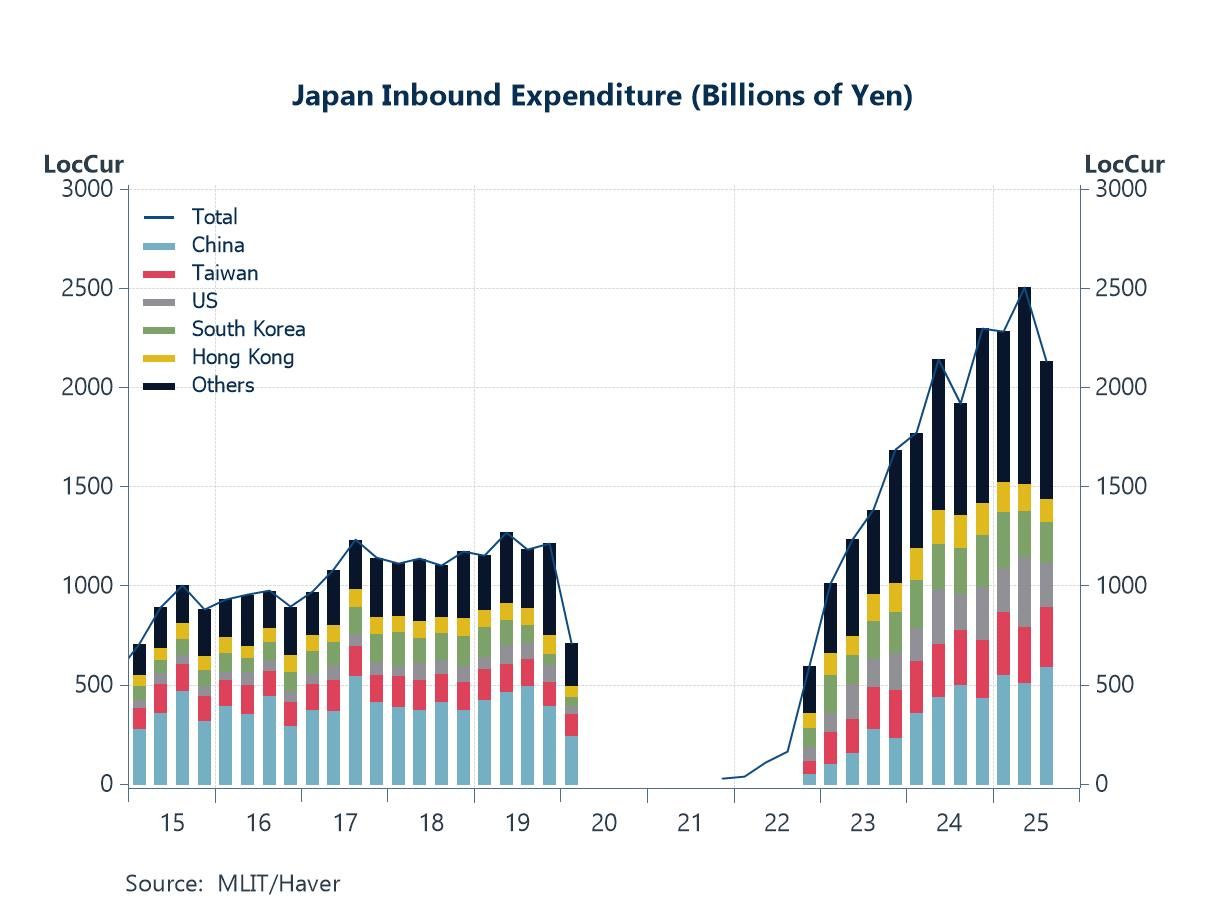 Global| Nov 26 2010
Global| Nov 26 2010Germany Different Than EMU...but It Is Still the Region's Bellwether...for Now
Summary
While Germany's IFO survey is still looking to be bullet-proof in October orders fell and fell sharply in September, setting a pattern to be followed throughout the e-Zone (see the accompanying table). German domestic orders dropped [...]
 While Germany's IFO survey is still looking to be bullet-proof in October orders fell and fell sharply in September, setting a pattern to be followed throughout the e-Zone (see the accompanying table). German domestic orders dropped slightly, but foreign orders plunged as they have done for other EMU members as well.
While Germany's IFO survey is still looking to be bullet-proof in October orders fell and fell sharply in September, setting a pattern to be followed throughout the e-Zone (see the accompanying table). German domestic orders dropped slightly, but foreign orders plunged as they have done for other EMU members as well.
This month's data may be perched on the cusp of change. We rarely see such divergence except when the economic gears are shifting, and shifting they are...
In Germany we continue to see its vaunted IFO index spinning off strong signals. Apparently consumer confidence is still strong in EMU as the European Commission let that nugget fly early. Ireland is in the cold embrace of austerity. It is set to cut some 7bln Euros from its budget, two-thirds from spending cuts and one-third from higher taxes. I'm sure that won't add to consumers' confidence around the Zone. Even if you are not Irish you can see what's coming. Demands are being made across the board.
As the zone's most favored economy Germany is setting the tone; the speed is to Germany's liking. But Germany is better positioned for this so its economy is still prospering while others struggle. Germany is reaping the benefits of having run the lowest inflation rate in the zone and having the best competitiveness. Spain, Portugal, Italy and Greece would love to devalue their currencies to reinvigorate their economies, but there are tethered to the Deutschemark in the no-love-lost lip lock called the Euro-Zone. Right now it must feel a bit like debtors' prison.
There are lots of rumors about the zone and about what happens next: Which countries are next to choke on the poison pill of austerity?
Will the Zone really come apart at the seams?
Will the Germans, angry about having to be the financial backstop to unworthy profligate fellow Euro borrowers, try to exit the Zone? Would they? Could they?
I don't think that a German exit is possible. The quid pro quo for German unification was the Europeanization of Europe. Not melding Zonal fiscal policies and trying to keep national identities while at the same time trying to blur them has shown itself to be the incongruent strategy that it was from the start. It has proved to be the Achilles heel of the unification that is not-unification. Still, if Germany wants to go it alone, what better way than to show those who 'would-be-German' what a steep hill it is to climb to be both fiscally responsible and to maintain a strong currency? The divergence, rather the persistent divergence in intra-EMU inflation rates tells the story of who is in trouble. Getting back in line will be an excruciatingly painful process. Devaluation, the traditional medicine, is no longer an option. Germany struggled with its own unification. Europe has a much less strong glue than that nationalism to depend upon.
What happens next is up for grabs, but don't expect it to play out quickly; there are slow-working and very painful processes in train. Anything could happen...almost... but only over time when it become clear that the actual pain exceeds the national embarrassment of the bailout.
Robert Brusca
AuthorMore in Author Profile »Robert A. Brusca is Chief Economist of Fact and Opinion Economics, a consulting firm he founded in Manhattan. He has been an economist on Wall Street for over 25 years. He has visited central banking and large institutional clients in over 30 countries in his career as an economist. Mr. Brusca was a Divisional Research Chief at the Federal Reserve Bank of NY (Chief of the International Financial markets Division), a Fed Watcher at Irving Trust and Chief Economist at Nikko Securities International. He is widely quoted and appears in various media. Mr. Brusca holds an MA and Ph.D. in economics from Michigan State University and a BA in Economics from the University of Michigan. His research pursues his strong interests in non aligned policy economics as well as international economics. FAO Economics’ research targets investors to assist them in making better investment decisions in stocks, bonds and in a variety of international assets. The company does not manage money and has no conflicts in giving economic advice.






